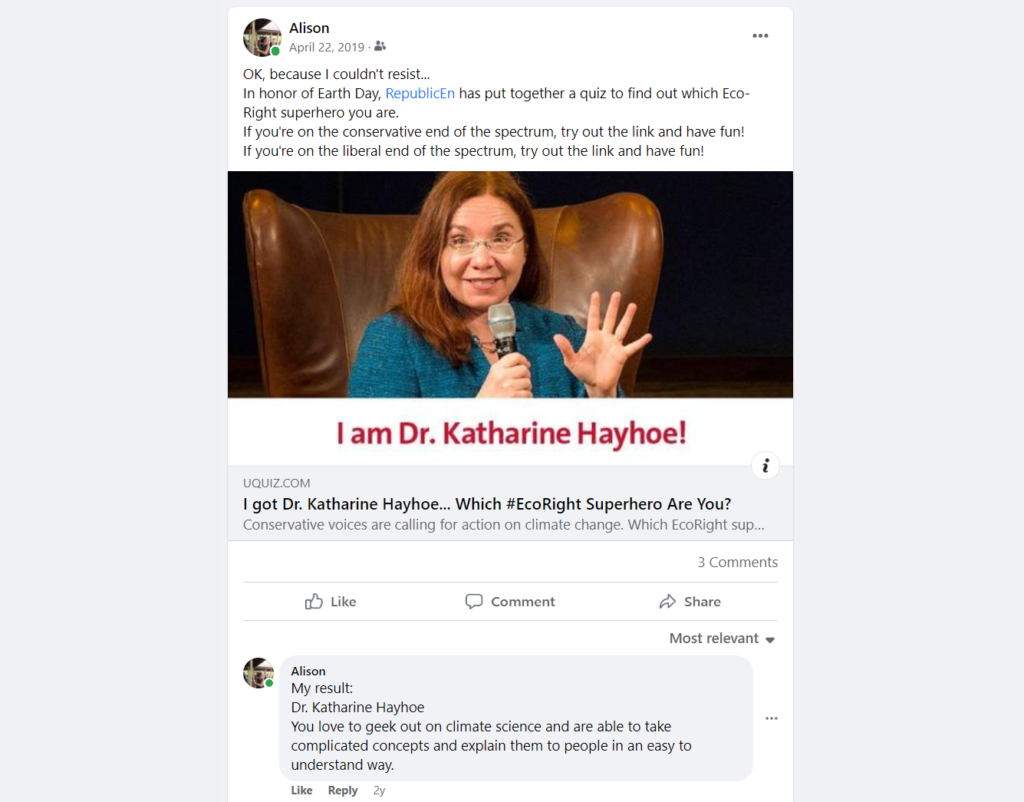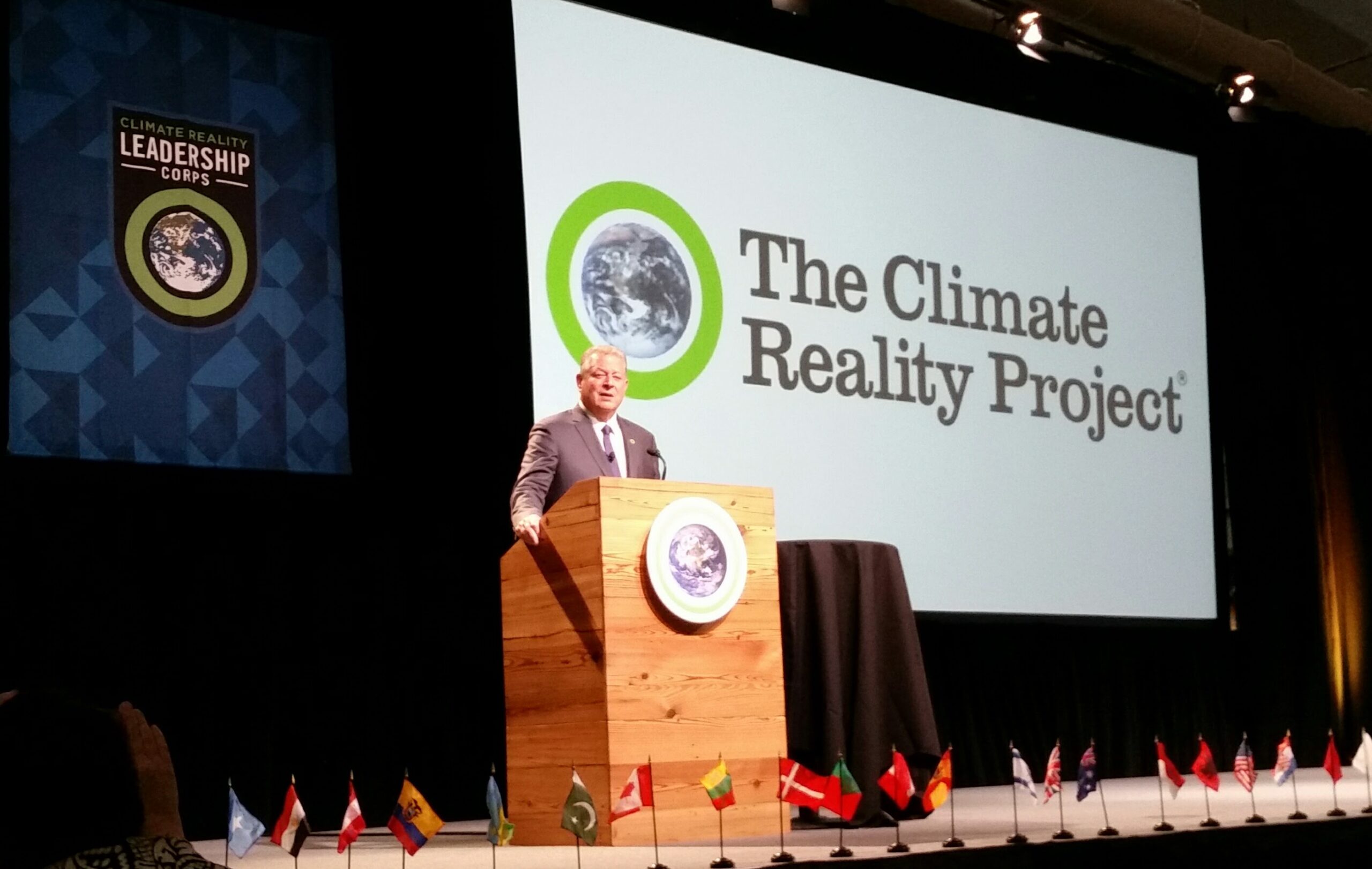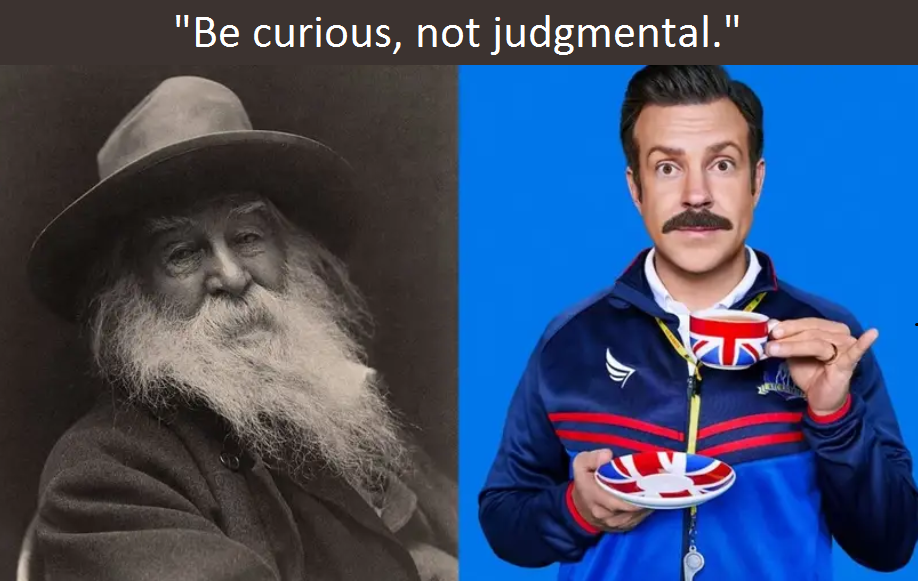Disclaimer, again: This blog is a work of my own, and my opinions do not represent the position of the Environmental Health Project.
In last week’s post,[1] I talked about the political divide that has grown in our country when discussing issues of scientific fact. Following the news can be an exhausting experience, especially when it seems like the situation is only getting more dire, with no hope in sight. When the stakes increase, humans tend to get scared and cling more strongly to their beliefs as a source of comfort. In 2022, I aim to do a better job of working past my own biases and building connections with people who disagree with me.
Connecting with Others
Around the same time I received the invitation for the Students for Liberty conference (through my association with RepublicEn), I started reading a book about climate change solutions called Saving Us: A Climate Scientist’s Case for Hope and Healing in a Divided World by Dr. Katharine Hayhoe.[2] I was going through a particularly rough patch of seasonal depression made worse by the compounding factors of COVID-19 preventing me from seeing my family at Christmas (again) and anxiety over climate change rearing its head whenever I turned on the news. It was my hope that this book would inject some much-needed optimism into my ever-darkening world. It was an interesting coincidence that Dr. Hayhoe first came to my attention a few years ago through RepublicEn, when I took their Earth Day quiz “Which EcoRight Superhero Are You?” and got her as my result.
Unlike many of the terrifying pictures painted by climate advocates in the news, her book was light on the consequences of inaction – there were some facts and data, of course, but that wasn’t the focus. Rather, her message was incredibly optimistic, pointing to the positive impacts of connecting with each other as human beings – the positive climate impacts of connecting with each other. Instead of dwelling on our divisions (as mainstream news and social media tend to encourage), Hayhoe guides her readers through conversation frameworks that begin with commonalities about where we live, our hobbies, our religions, and so on. It is through building this common ground with others that we can talk first about what we love and then how climate change may affect it.

Inspiring and optimistic, her book got me very excited to speak at this conference, in front of a group of people who fell outside what my typical audience has looked like. And, ultimately, it was comforting for me to think that this audience and I would have areas of overlap with regard to personal politics and philosophies, which, incidentally, I don’t see as being in conflict with anything I do in the professional sphere. (Indeed, I couldn’t do the work I do with any scrap of authenticity if I didn’t feel alignment between the personal and professional.) All of those feelings came together and reinforced the sense that I need to be doing more – in general – to support collaboration, rather than fueling division.
Finding Solutions
Dr. Hayhoe described interactions with people who have been downright hostile to her, given her position on climate change, which is based on scientific fact. With a bachelor’s degree in science myself, I find it hard to believe when anyone dismisses peer-reviewed facts out of hand or approaches a contentious subject without even being willing to examine their own biases, but it happens all the time. With an MBA on top of that, I’m also aware of how easy and common it can be to massage numbers and take them out of context to prove a point – a point that could be completely unfounded – but this also happens all the time.
Additionally, the source of said information can matter just as much as anything else: if you don’t trust the speaker, it’s hard to believe the message, no matter how reliable the data. The opposite is also true: if you do trust the speaker, it’s very tempting to believe what you hear without question. That is why making an individual connection and establishing some level of common identity with others is so critical to having productive conversations.

It wasn’t until I was about halfway through Dr. Hayhoe’s book that I realized the resonance with my own studies. My graduate research fellowship focused on the concept of “superordinate social identity,” which is a fancy way of describing how expansive and inclusive someone’s self-defined “group” is. For example, I could label myself as a Pittsburgher, or a Pennsylvanian, or an American: each successive label is a higher-order (super-ordinate) group and therefore more inclusive. If I see more people as part of my “group,” I am more likely to feel some level of connection with them through a common identity, and I am further more likely to trust and share with them, be it information or ideas.
My fellowship advisor has spent her career studying this aspect of organizational behavior and how it impacts knowledge transfer within companies. Our argument was that if people see themselves as part of the same higher-order team (e.g. members of the same company, rather than members of competing project teams; members of the same industry, rather than members of competing companies), they will be more likely to work cooperatively / collaboratively to implement more innovative / more sustainable solutions to tackle climate change.[3]
Remaining Open
The other critical aspect of building effective solutions is not simply listening to someone else, nor is it simply seeing yourself as on the same team as someone else. In order to really pave the way for connection, we need to do something even harder than either of those things: accept the fact that we are not – and will never be – completely and solely right. No matter how much information you have on a subject, you are fundamentally incapable of having it all. You may have all the scientific studies in the world but not understand someone’s lived experience; you may understand all of the analysis on jobs benefits tied to an industrial practice but not have any information on how resulting health impacts will negatively affect a local economy.

In a sense, what I’m describing is an application of the scientific method. I’ve gone into detail about the scientific method before on this blog, specifically in my Summer 2020 series on COVID-19,[5] and how all we can ever do is make the best decisions possible with the limited information we have. But part of that approach necessitates our acceptance of the fact that we are working with incomplete information. We can incorporate new information as it becomes available and modify a particular approach or position, but it is incredibly difficult – particularly when stakes are high and absolute certainty feels so comfortable – to admit that we don’t have all the facts. And “all the facts” doesn’t necessarily mean scientific facts (though it could); it can also mean understanding the needs of people who are impacted by a given decision or approach.
It may sound trite, but it’s essential: the way to achieve realistic, sustainable solutions to problems is to gather as much information as possible from various stakeholder groups. Someone with a very different lived experience is likely to have a very different perspective than you, complete with very different concerns and priorities. Big decisions are frequently made without the input of people who are likely to be impacted the most, resulting in social and environmental injustices that could have been avoided – or at least minimized – with a more thoughtful approach from the beginning.[6] A way around that is to stay open to learning from people who may not be in what you define as your “group” … and the way to make that easier is to identify how you share a collective identity, even if it’s just “fellow human being” or “inhabitant of Earth.”
I speak from experience in saying that it can be scary to admit that you don’t know something, but it’s also important to recognize that we all have blind spots – because then it makes it easier to stay flexible when we learn new information that might change an opinion or an approach. I have never claimed to be an expert, which, I will admit, helps me save some face when I need to step back and reassess my position when I learn something new. So, to that end, in 2022 I will be doing my best to lead with curiosity, not judgment, when encountering differences.
~
Have you had an incredible breakthrough or connection with an unlikely person? I would love to hear your story in the comments.
Thanks for reading!
[1] https://radicalmoderate.online/saving-us-getting-through-2022-together-part-1/
[2] https://www.goodreads.com/en/book/show/56379758-saving-us
[3] https://www.amazon.com/Managing-Climate-Change-Business-Consequences/dp/0230115837
[4] https://www.snopes.com/fact-check/be-curious-not-judgmental-walt-whitman/
[5] https://radicalmoderate.online/face-masks-and-social-distancing-part-1/
[6] https://nonprofitaf.com/2019/04/solutions-privilege-how-privilege-shapes-the-expectations-of-solutions-and-why-its-bad-for-our-work-addressing-systemic-injustice/
0 Comments